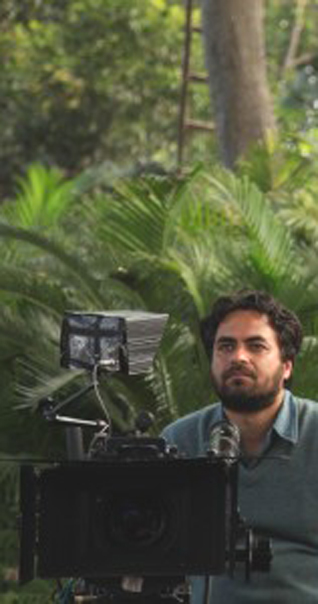Film/Stage
Punjab’s Master Story Teller:
Filmmaker
Gurvinder Singh
SUHANI SINGH
The overcast early afternoon at the Pune University's sylvan campus could well be a melancholic backdrop for a Gurvinder Singh film.
The Director of two internationally acclaimed Punjabi films - ‘Annhe Ghorrhe Da Daan’ and ‘Chauthi Koot’ (which releases on August 5) - sits on a damp bench facing the university's Victorian Gothic main building.
This is where he found himself after dropping out of the National Institute of Fashion Technology and working at an ad agency in New Delhi, to top the entrance exam for mass communications. Pune is where he would discover foreign cinema-at the Alliance Francaise, Max Mueller Bhavan and the National Film Archives, where he would study direction at the Film & Television Institute from 1997 to 2001, read Hindi novels and translations of Punjabi ones (Gurdial Singh's ‘Anhe …’ being the first) and finally buy a house not far from the Film Institute.
It's a temporary home. For Gurvinder now lives in a forest above Bir in Himachal, where he writes, paints and grows vegetables.
"I always longed to move away from the city," he says. "It's a holiday cum workspace."
There was enough indication in his adolescence that Gurvinder would be an oddity in the subcontinent’s film scene. That he would militate against its commercial diktat and work with non-professional actors. That stillness and silence would convey more than dialogue and song in his films.
Born and brought up in the west Delhi neighbourhood of Rajouri Garden, he spent hours scouring issues of ‘Illustrated Weekly’ and reading books on prehistoric and modern art. His pocket money he spent on buying tapes of classical music or copying portraits of Rembrandt, Van Gogh and Gauguin. He sat in the libraries at the Lalit Kala and Sahitya Kala Akademis, and took solitary walks around the Red Fort or Purana Qila, wandering sometimes to the adjacent Delhi Zoo, just watching the animals.
Now his films feature characters walking, often in dark, unsettling landscapes, and animals-a sick goat in ‘Annhe‘, Gaddi dog Tommy in ‘Chauthi Koot‘, a pigeon in Pathankot in his forthcoming short.
What makes Gurvinder's films fascinating is that he has never lived in Punjab, yet has a finger on its pulse. He visited the Darbar Sahib in Amritsar as a child and, after his graduation from the Film Institute in 2001, toured the ancient land of Punjab for four years, exploring its rich musical tradition.
"To get that certain authenticity of how people talk, of relationships, the expressions, you need to live there," he says. "But I get it when I read something. Then I take it as the base and fuse my own experiences of having travelled and met people."
In Gurvinder's cinematic world, the soundscape is as detailed as the images.
"There is always a lovely dialogue going on between music and painting when I'm making a film," he adds.
Gurvinder doesn't spoon-feed his audience, he engages it. So he gets calls from a San Francisco Dalit cabbie eager to share his life story as well as posts from irate viewers on Facebook accusing him of wasting their time.
Gurvinder is pleased so long as he gets a reaction.
"Ambiguity excites me," he says. "I like films which are open-ended."
Mainstream producers in Punjab have taken note. Gurvinder, whose two films, both literary adaptations, have premiered at Venice and Cannes respectively, is now heralded as a filmmaker who has put Punjabi cinema on the world map and taken it beyond Punjab, the subcontinent and diaspora audiences in Canada and the US.
Fear besets his reel characters but Gurvinder himself is fearless. He was critical of ‘Bahubali’ winning the National Award.
His producer accepted the award for ‘Chauthi Koot‘, tracing characters caught in the conflict between the Sikh resistance fighters and India’s police in Punjab's fight against India’s human rights violations.
"How can I take awards from the same people who are hell-bent on destroying institutes like the Film Institute?" he says.
He lauds the French for giving "many grants to filmmakers" and seeing them not just as artists but "as philosophers".
"Here cinema is too synced with entertainment," he says.
He is now writing what he calls a "reflective comedy" which he hopes to shoot in Punjab next spring. He has also been commissioned to direct a film on artist Atul Dodiya. Punjab, however, will remain his muse even though he says the state "is going down the drain culturally".
"In the name of culture today, we have films about caste identity. Or songs about drinking, guns, women. The kind of work being produced in the state is completely different from its people who are very nice, open, sensitive and hospitable."
In Gurvinder's cinema, Punjabis, if not Punjab, can find salvation.
[Courtesy: India Today. Edited for sikhchic.com]
July 21, 2016



